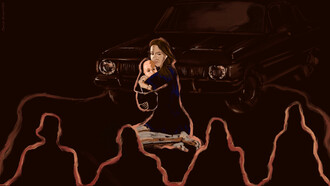The film American Fiction, based on the 2001 novel Erasure by Percival Everett, is the tale of a frustrated Black novelist who writes a biting and outlandish satire of stereotyped Black books. The narrative however, is regarded by the publisher as serious literature true to Black life and culture, and received high critical praise and economic success.
The storyline is of a fellow named Thelonius “Monk” Ellison who is angered and disgusted with the success of the novel We’s Lives in Da Ghetto, written by Sintara Golden, which panders to traditional and conditioned Black stereotypes. He decides to write My Pafalogy, a satirical novel that mocks the stereotypes expected from Black writers. The novel, later named Fuck becomes a phenomenal success.
The American literary and movie-going public has proven the profitability and enthusiasm for this stereotypical narrative of Blacks. The novel Push, which brought to the public every possible negative stereotype of the Black female mother was a phenomenal success. The book won the Book-of-the-Month Stephen Crane award for First Fiction, the Black Caucus of the American Library Association’s First Novelist Award, and in Great Britain, the Mind Book of the Year Award. Push was named one of the top ten books of 1996 by the Village Voice and Time Out New York. The movie based upon the novel went on to be an award winner at the Cannes Film Festival. Interestingly, while Black people held contrary views of the novel, Push was even nominated for an NAACP Image Award for Outstanding Literary Work of Fiction. The movie, Precious, went on to become a Sundance Film Festival winner.
The conditioned narrative of Blacks is controlled by white voices. This is demonstrated by the power held by the media, literary and otherwise, to maintain and reinforce the narrative of the cultural, intellectual, and moral inferiority of Blacks. This stereotyped narrative offers a basis for crystalizing the lower status of Blacks in the American mind. Images like those portrayed on screen are even more powerful tools to elicit specific emotional reactions.
But why the popularity and even obsession with the stereotyped narrative of Black people? What psychological needs might be met by the humor of Black dialect, gait, and actions being in the vicarious world of the pathological other, the culturally, intellectually, and morally inferior Black?
The psychological power of the stereotypical narrative and images of Blacks on film can, for white viewers, possibly meet and boost white needs of identity, belonging, and self-esteem. One’s whiteness as separate from the blackness on screen can create a sense of identity through skin color and affirms one’s individual and collective white identity of belonging to the white race, and the need to be thought of as a superior being. The external reinforcement of self-worth provided by the Black characters offers racial validation.
The value and power of whiteness originates in an external source and is dependent upon the mythology of black inferiority and comparison to blackness. In this situation, art unfortunately provides a medium that embraces and reinforces these stereotypes. The film American Fiction provides insight into the reality of beliefs about Black character. If one can look beyond the humor this message can be revealed—stereotypical Black images perpetuate the beliefs that undergird white supremacy ideology, promote racial separation, and most critically prevent the development of multiracial class consciousness.
American Fiction is a truly timely film, a thorough critique of a culturally conditioned narrative and the stereotypical beliefs about Blacks. The stereotypes portrayed in the film, while considered comedy or satire, are in reality those held about Black people in this country. These satirized straw men in the film are a long held tradition of the American subconscious; these culturally conditioned beliefs about those with black skin are deeply entrenched in the hearts and minds of too many whites in this society.














